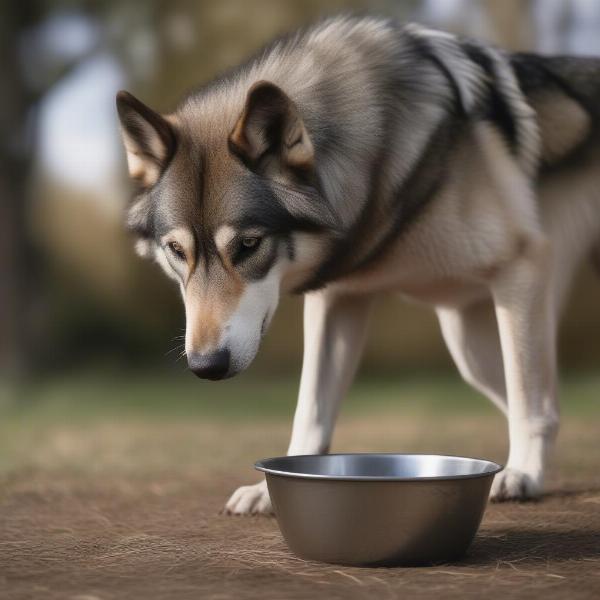Wolf dog food has become increasingly popular, often marketed as a more natural and primal diet for our canine companions. But is this trendy food truly beneficial for dogs, or is it just clever marketing? This article will delve into the world of wolf dog food, examining its ingredients, potential benefits, and drawbacks to help you make informed decisions about your dog’s nutrition.  Wolf dog eating from a bowl
Wolf dog eating from a bowl
Understanding the Appeal of Wolf Dog Food
The allure of wolf dog food often stems from the romanticized notion of connecting our domesticated dogs to their wild ancestors. Many brands highlight high meat content, claiming it mimics the diet of a wolf in the wild. This resonates with owners seeking a more natural, less processed diet for their furry friends. However, it’s crucial to remember that domestic dogs have evolved significantly from wolves, and their nutritional needs differ.
While wolves primarily consume raw meat, they also eat berries, grasses, and other plant matter, which provide essential vitamins and minerals. Commercial dog food, even those inspired by wolf diets, aims to provide a balanced nutritional profile tailored to the specific needs of domestic dogs.
Decoding the Ingredients: What’s Really in Wolf Dog Food?
Many wolf dog food brands emphasize high protein content, often derived from various meat sources. wolf of wilderness dog food However, not all protein is created equal. The quality of the protein source, its digestibility, and the amino acid profile are crucial factors determining its nutritional value for dogs.
Look for dog foods that specify the type of meat used, such as chicken, beef, or lamb, rather than generic terms like “meat meal” or “animal by-products.” Additionally, consider the inclusion of fruits, vegetables, and whole grains, which provide essential fiber, vitamins, and antioxidants.
Is Wolf Dog Food Right for Your Dog?
Determining whether wolf dog food is suitable for your dog requires careful consideration of their individual needs. Factors such as age, breed, activity level, and any underlying health conditions play a significant role. Puppies, for instance, have different nutritional requirements than adult dogs, and senior dogs may benefit from specialized diets to support their aging bodies.
Consulting with your veterinarian is crucial before making any significant dietary changes. They can assess your dog’s specific needs and recommend the most appropriate food to ensure they receive optimal nutrition.
Potential Benefits and Drawbacks of Wolf Dog Food
Some proponents of wolf dog food argue that it can lead to improved coat health, increased energy levels, and better digestion. However, these claims are not always supported by scientific evidence. dog food with wolf The high protein content in some wolf dog foods can be problematic for dogs with certain kidney or liver conditions.
Furthermore, some dogs may experience digestive upset when transitioning to a high-protein diet, especially if they are accustomed to a lower protein kibble. A gradual transition is essential to minimize the risk of digestive issues.
Addressing Common Concerns: Is Wolf Dog Food Safe?
One frequent question is whether wolf dog food can make a dog aggressive. There is no scientific evidence to support this claim. A dog’s behavior is influenced by a multitude of factors, including genetics, training, and socialization, rather than their diet. dog food with wolf on it
Another concern is the potential for nutritional imbalances. While some wolf dog foods offer a complete and balanced diet, others may be deficient in certain essential nutrients. Carefully reviewing the ingredient list and guaranteed analysis is crucial to ensure the food meets your dog’s nutritional requirements.
Conclusion
Wolf dog food can be a viable option for some dogs, but it’s important to approach it with a discerning eye. Prioritize quality ingredients, consult with your veterinarian, and monitor your dog’s health closely after making any dietary changes. Remember that a balanced and appropriate diet is essential for your dog’s overall well-being, regardless of marketing trends. high meat content dog food
FAQ
- Is wolf dog food suitable for all dog breeds? Not necessarily. Individual needs vary based on factors like age, breed, and health conditions.
- Can wolf dog food make my dog aggressive? No, there’s no scientific evidence linking wolf dog food to increased aggression.
- What should I look for in a high-quality wolf dog food? Prioritize specified meat sources, a balanced nutritional profile, and avoid generic “meat meal.”
- Should I consult my vet before switching to wolf dog food? Absolutely. Your vet can assess your dog’s individual needs.
- How do I transition my dog to a new food? Gradually mix the new food with the old over several days to avoid digestive upset.
- Are there any risks associated with feeding wolf dog food? Some dogs may experience digestive issues or develop nutritional imbalances if the food is not carefully selected.
- What are the potential benefits of wolf dog food? Some dogs may experience improved coat health and increased energy, but these claims are not always scientifically proven.
About ILM Dog: ILM Dog is your trusted global resource for expert advice on dog care and breeding. We offer practical, reliable information on a wide range of topics, from choosing the right breed to ensuring your dog’s health and well-being. Whether you’re a seasoned dog owner or just starting your journey, ILM Dog is dedicated to providing valuable insights to help you give your furry friend the best possible care. For personalized guidance on dog nutrition, training, and more, contact us at [email protected] or call +44 20-3965-8624.